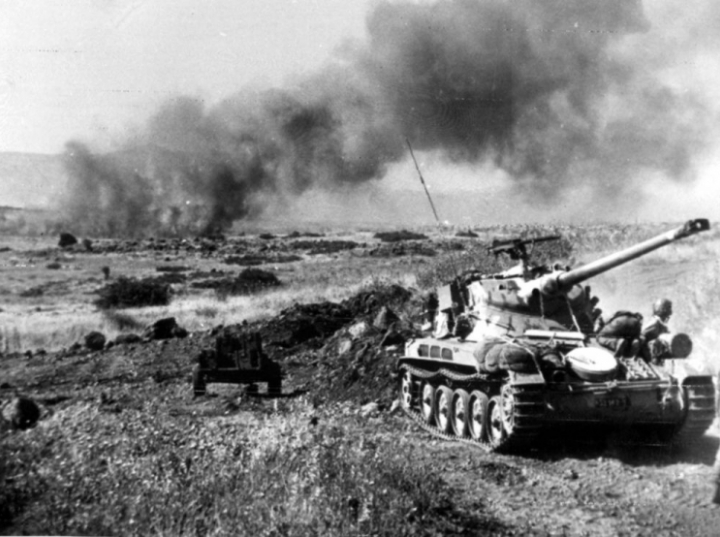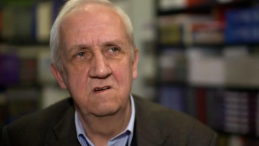55 years ago, on June 12, 1967, the government of the Polish People’s Republic, by order of the Kremlin, severed diplomatic relations with Israel. The decision was the result of the defeat of the Arab states supported by the Soviet Union in the Six Day War. This incident started an “anti-Zionist” purge among regime officials.
Communist-controlled Poland was one of the countries that quickly recognized the existence of the State of Israel after proclaiming independence (1948). Initially, the new country had the support of the Soviet Union and its satellite states. Western countries declared their distance from it. The period of true relations between communist countries and the government in Tel Aviv culminated in Prime Minister Golda Meir’s visit to Moscow. The Israeli prime minister was received enthusiastically by the local Jews. This reaction was a signal to the paranoid Stalinist regime that Soviet citizens of Jewish origin were not loyal to their country. The cooling of relations with Israel was also a signal to prepare for the next major wave of repression, which would also affect the Jews in the Soviet Union. It didn’t happen because of Stalin’s death. Three weeks earlier, the Soviet Union severed ties with Israel. Israel’s relations with Poland have also cooled. There was only an increase in disbursement in 1956. According to Israeli politicians, until 1967 relations between Warsaw and Tel Aviv remained much better than with other communist bloc countries.
Reports from the Security Service further shed light on the true public mood in June 1967. They highlighted concerns that severing diplomatic relations with the Jewish state would result in repression of the Jews in Poland.
On June 5, 1967, Israel launched a preemptive strike against neighboring Arab states that were preparing for aggression. The operation was a victory for the Israeli army, which defeated Egyptian, Syrian and Jordanian forces within six days, and thus the countries backed by arms supplies by the Soviet Union. Communist propaganda immediately portrayed Israel’s actions as imperialist aggression. The decision to sever diplomatic relations with Israel by the Soviet Union and the “people’s democracies” subordinate to it was made in Moscow at a meeting of the Advisory Committee of the States Parties to the Warsaw Pact, held on 9-10 June 1967 Romania is not subject to orders Kremlin, it distanced itself more and more from Soviet policy. On June 10, Moscow and Prague cut ties with Tel Aviv. The Ministry of Foreign Affairs of the Polish People’s Republic announced this decision two days later. Relations with Israel also cool some Western countries. Under the embargo announced by President Charles de Gaulle, France is no longer the main supplier of combat aircraft to Israel. In this role, he was replaced by the United States, which for the next several decades became Tel Aviv’s closest ally.
On June 12, Władysław Gomułka spoke of “organizing offerings in several institutions on the occasion of Israel’s victory” and reported on the statement of “an author who claims that he has two homelands: Israel and Poland”. It was the first announcement of a propaganda narrative to emerge in the next few months about the disloyalty of “some citizens of the Polish People’s Republic of Jewish origin” to their own country. Reports from the Security Service further shed light on the true public mood in June 1967. They highlighted concerns that severing diplomatic relations with the Jewish state would result in repression of the Jews in Poland.
The aim of Moczar’s actions was to strengthen his political position. He believed that he could succeed Gomułka as first secretary of the Central Committee of the Polish Workers’ Union Party.
On June 19, Gomułka spoke at the VI Congress of the Trade Unions. In a two-hour speech, he spoke about Israel’s persecution of the Arab population. A fragment in which he stated that “every Polish citizen should have one homeland – People’s Poland” has gone down in history. A few days later, the Minister of the Interior, Mieczysław Moczar, spoke in a similar vein, comparing Israel’s actions to German terror during World War II at the Interior Ministry College meeting. During the same discussion, a list of 382 people from various walks of life of Jewish descent were drawn up to defend Israel. Department III of the Interior Ministry was ordered to continue “investigations into the Zionists”. In this way, the purge of the army, party and state apparatus began, culminating in the events of March 1968. The surveillance of the Jewish Social and Cultural Society in Poland and the examination of correspondence addressed to Israel were also intensified. Many of the resources involved in detecting the perpetrators place the inscription “Long live Israel” on the walls of the Soviet army barracks in Legnica. It was one of the many expressions of joy over the victory of “our Jews” over the “red Arabs”.
The aim of Moczar’s actions was to strengthen his political position. He believed that he could succeed Gomułka as first secretary of the Central Committee of the Polish Workers’ Union Party. According to Gomułka’s biographer, Dr. Robert Spałek, the aim of Moczar’s actions was to confuse the First Secretary of the Central Committee of the Polish Workers’ Union Party by presenting him with reports that exaggerated the number of “Zionists” in the party ranks. The head of the Ministry of Home Affairs can count on the support of a large number of mid-level and lower-level party officials. “PZPR is in turmoil, youth + nationalists + are pressing for a settlement and taking over after – conventionally – + old Jewish Stalinists +. On the one hand, Gomułka took over part of Moczarow’s national-patriotic rhetoric so effectively that after years of the year he himself was recognized as the greatest anti-Semitic in the Polish Union of Workers Party, and on the other hand, in the spring of 1968, he softened anti-Semitic sentiments and tried to direct it towards the intellectuals in general, ”the historian wrote in the article “I have .. such a party”, or Gomułka as an anti-Semitic communist? ” on the website of the National Memorial Institute.
The peak of the anti-Zionist campaign, which quickly turned into an attack on intellectuals reluctant to Moczar, was March 1968. In the months that followed, Gomułka and its surroundings came to an end and Moczar’s influence weakened.
The speeches of the First Secretary of the Central Committee and Moczar were a signal to the “partisan” factions that it was possible to proceed. Moczar’s supporters are well prepared to fight for power. The deputy minister of national defense was General Grzegorz Korczyński, MO was led by General Tadeusz Pietrzak, and intelligence was led by General Teodor Kufel. The “Partisans”, using a mixture of nationalist and communist ideologies, tried to influence public opinion and make changes in the leadership of the Polish United Workers’ Party. For their activities, they have the support of, among other things, the Association “Pax”, whose leader Bolesław Piasecki believes that an alliance with Moczar will allow him to assume the highest state functions. The diocese protested against associating its activities with the Church. In the declaration of 29 December 1967, the bishops stated that they had never heard Piasecki’s voice “in defense of the freedoms and rights of the Church. However, constant attacks on the Diocese were repeated, accusing the Diocese of not taking into account the Polish raison d’état, which led to conflicts with state authorities.”
“In addition, the anti-Jewish campaign turned into a broader phenomenon – anti-intelligence battles. The so-called anti-Zionist campaign, which basically boils down to an outburst of dislike, and in extreme cases of hatred, against people of Jewish or unsuspecting origin,” notes Dr. Robert Spałek. The peak of the anti-Zionist campaign, which quickly turned into an attack on intellectuals reluctant to Moczar, was March 1968. In the months that followed, Gomułka and its surroundings came to an end and Moczar’s influence weakened. “This is unacceptable at a party! If the party is anti-Semitic, I don’t care about this party!” – according to Józef Tejchma’s account, Gomułka was angry that the propaganda campaign had spiraled out of control of the party leadership. In July 1968, Moczar was dismissed from the post of head of the Ministry of the Interior. His downfall was sealed by Moscow, which saw in him a politician fighting for the greater independence of the Polish People’s Republic from the Soviet Union.
Polish-Israeli relations, which were severed in 1967, resumed after nearly a quarter of a century. On 27 February 1990, the foreign ministers of Poland and Israel signed a protocol on the resumption of diplomatic relations. A month later, Poland gave a declaration of support to the United States in arranging the transfer of thousands of Jews from the Soviet Union to Israel as part of the clandestine Operation Bridge. Many of them reached their new homeland via airports in Okęcie and Dworzec Gdański, which were places from where citizens of the Polish People’s Republic of Jewish origin left for Israel after the events of 1967–1968. (PAP)
Author: Michał Szukała
search / skp /

“Reader. Future teen idol. Falls down a lot. Amateur communicator. Incurable student.”




![Bogusław Wołoszański: “Achieving nuclear weapons would be the beginning of World War III” [WYWIAD]](https://storage.googleapis.com/bieszczady/rzeszow24/articles/image/877236c0-66fd-457a-9eb4-41792f9077ff)




